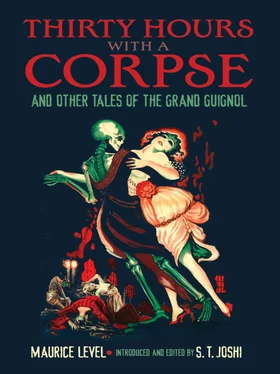He seemed to do so, but about two in the morning he became very restless. They sent for the nun.
“Well, and what’s all this about?” she said as she bent over him. “You are not being good?”
He burst into harsh, incoherent words that came in gasps.
She took one of his hands in hers and with the other gently wiped the perspiration from his forehead, trying to calm him.
Soothed as if by a caress, he grew quiet. He breathed more easily, his voice was even, his words intelligible.
“Yes, I know I am late… It was my work that kept me… I will come earlier next time. You don’t like the flowers?… On Sunday we will pick a lot… We will go to the river for the day, we will have dinner on the grass… We will go home early, and you will see how much I love you… If you only knew how much I love you! I love your eyes and your hair… all of you. Your skin smells like flowers.”
This was said in a tone of supplication, and it sounded like a passionate prayer. But soon he was talking too quickly again, the words running into one another.
The nun, her eyes anxious, let him talk on, and the prayers she murmured mechanically sounded like the accompaniment to a Song of Love.
He began to moan and shudder, and suddenly he sprang up:
“What! Going away? Never see you again!…”
He was panting now, the breath coming in short, painful gasps. The nun hurriedly brought a light and looked carefully at him.
He was livid, and his eyes were wild. Deep shadows stretched from the eyes to the corner of the lips; the temples seemed to have fallen in. Drenched with perspiration, his hair was sticking in wisps to his forehead, and his palpitating nostrils seemed to draw all the rest of his face to them.
Ah! she knew them, these agonized faces that looked as if the mind were trying in one minute to live over again the whole of a life…
Softly, so as not to disturb those in the other beds, she said to a night-nurse:
“Quick… quick… bring the doctor and send for the chaplain… No. 6 is very ill…”
Kneeling by the bed, she began to pray: “Thy will be done, O God, but pardon, oh, pardon this poor child.”
The dying boy had taken her folded hands in his and went on talking, but his voice was now quiet, far, far away.
“Don’t go… I will give you everything you want… Anything, if you only will stay with me… If you leave me, I shall die… Come…”
His head brushed against the forehead of the nun. His neck stretched forwards, he bent toward her.
“Come… I adore you…”
He was touching her eyes and cheeks… He reached her lips—
She started back and tried to rise.
But he grasped her shoulders, and his dream carrying him right over the threshold of eternity, he implored:
“Oh, stay… I love you…”
She shut her eyes and bent her head. He pressed his lips on hers in a long, fervent, noiseless kiss, one of those deep kisses in which two beings merge their identity, a kiss like those he had learned in the arms of the prostitute.
Under it the trembling lips of the nun opened—was it in a last prayer? Or had her thoughts flashed back to the fiancé whose death had turned her life to God?
HE WAS neither malicious nor bloodthirsty. It was only that he had conceived a very special idea of the pleasures of existence. Perhaps it was that, having tried them all, he no longer found the thrill of the unexpected in any of them.
He went to the theatre, not to follow the piece, or to look through his opera-glasses at the spectators, but because he hoped that some day a fire might break out. At the fair of Neuilly he visited the various menageries in anticipation of a catastrophe: the tamer attacked by the beasts. He had tried bullfights, but soon tired of them; the slaughter appeared too wellregulated, too natural, and it disgusted him to watch suffering.
What he was always looking for was the quick and keen anguish caused by some unexpected disaster, some new kind of accident; so much so that, having been at the Opéra Comique on the night of the great fire, from which he escaped unhurt; that, having been a couple of steps from the cage the day the celebrated Fred was devoured by his lions, he lost almost all interest in theatres and menageries. To those who were astonished at this apparent change in his tastes, he replied:
“But there’s nothing more to see there. They don’t give me the slightest sensation. All that I care for is the effect produced on others and on me.”
When he was deprived of these two favorite pleasures—it had taken him ten years to get what he wanted from them—he fell into a state of mental and physical depression, and for some months rarely left his house.
Then came a morning when the walls of Paris were covered with multi-colored posters that showed, on an azure background, a curious inclined track that came down, wound round, and fell like a ribbon. Up at the top, little bigger than a dot, a cyclist seemed to be waiting for a signal to rush down the giddy descent. At the same time the newspapers gave accounts of an extraordinary feat that explained the meaning of this weird picture.
It seemed that the cyclist dashed down the narrow path at full speed, went up round the loop, then down to the bottom. For a second during this fantastic performance he was head downwards, his feet up in the air.
The acrobat invited the press to come and examine the track and the machine so that they might see there was no trickery about it, and he explained that his ability to perform the feat was due to calculations of extreme precision, and that so long as he kept his nerve nothing could prevent its accomplishment.
Now it is certain that when the life of a man hangs on keeping his nerve, it hangs on a very insecure peg!
Since the appearance of the advertisement, our maniac had recovered some of his good humor. He went to the private demonstration, and becoming convinced that a new sensation awaited him, was in a seat on the first night to watch closely this looping the loop.
He had taken a box that faced the end of the track, and he sat there alone, not wishing to have near him anyone who might distract his close attention.
The whole thing was over in a few minutes. He had just time to see the black speck appear on the end of the track, a formidable spurt, a plunge, a gigantic bound, and that was all. It gave him a thrill, swift and vivid as lightning.
But as he went out with the crowd, he reflected that though he might feel this sensation twice or thrice, it must eventually fail, as all the others had done. He had not found what he was looking for. Then came the thought that a man’s nerve has limitations, that the strength of a bicycle is, after all, only relative, and that there is no track of the kind, however secure it may seem, that may not some time give way. And he arrived at the conclusion that it was inevitable that some day an accident must occur.
From this to deciding to watch for that accident was a very small step.
“I will go to see this looping of the loop every night,” he decided. “I will go till I see that man break his head. If it doesn’t happen during this three months in Paris, I will follow him elsewhere till it does.”
For two months, every evening at the same time, he went to the same box and in the same seat. The management had grown to know him. He had taken the box for the whole period of the turn, and they wondered vainly what could account for this costly whim.
One evening when the acrobat had gone through his performance earlier than usual, he saw him in a corridor and went up to him. There was no need for an introduction.
“I know you already,” said the bicyclist. “You are always at the hall. You come every night.”
Читать дальше












